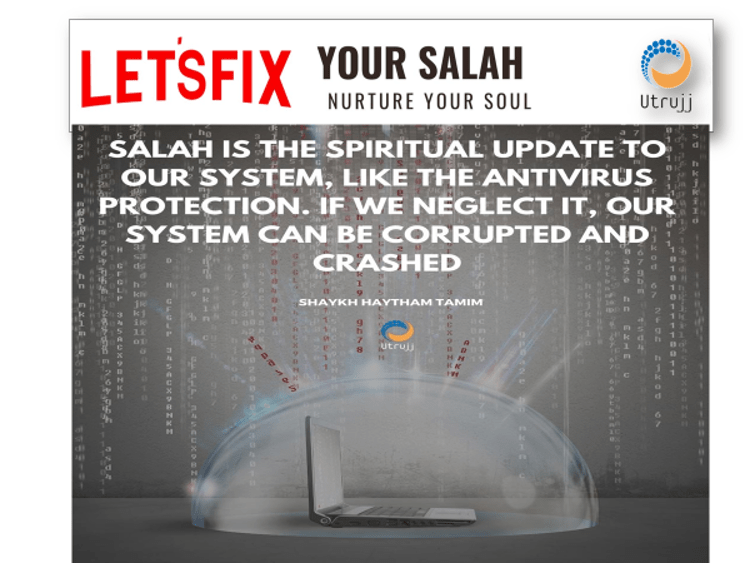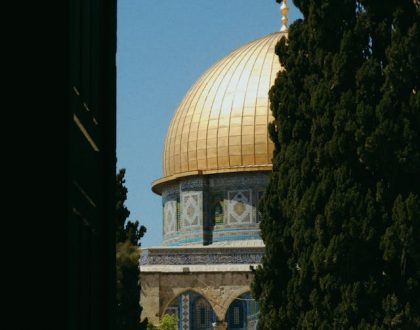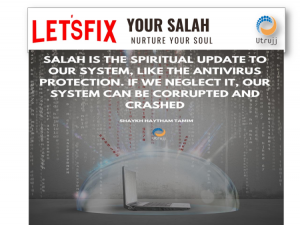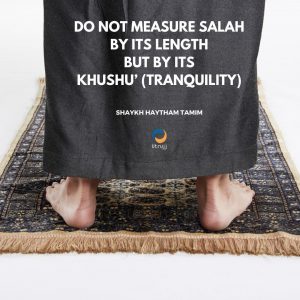Fix your salah

Total connectivity to Allah
During one moonlit night, there was an extraordinary episode, when Abbad bin Bishr, one of companions guarding an army of believers was praying as they slept. Through the darkness a stranger shot an arrow at him, which pierced him. What happened next?
Abbad pulled out the arrow and continued to pray.
The enemy shot another arrow, and again, Abbad undeterred, pulled out the arrow and then continued to recite.
When a third arrow struck him, conscious of his duty to alert the men he was guarding of the threat, he finished his salah. Surprised that he had not cut his salah short, they asked Abbad why he had continued. He replied that he had been in the middle of reciting a surah (Yasin) and had not wanted to cut it short.
When I read this story, I wondered how it was possible that the pain of these arrows did not phase Abbad at all?
He was so fully focused on what he saying in his salah that he was in a different zone, numb to his injuries, even though he was bleeding. It tells us that Abbad was so deeply engaged in reciting, that his salah meant more to him than pain of being shot.
This seems quite strange to us.
Today, if we get a mosquito bite it can be enough to ruin our salah. Yet, Abbad only ended his salah because he was more concerned about his duty to the army than his pain. Compare that to us, and our salah. How our minds are filled with our kids, our work and our dunya issues, and they keep playing in our mind and during our salah. Ironically, we even find solutions to our issues in our salah.
Yet the companions did not pray like this. Their salah was different and we can see that their achievements were way beyond what we can imagine because of their full connection with Allah Almighty.
Prayer is light
The Prophet (peace be on him) said:
Salah is light. (Ibn Majah)
Did he mean light literally or metaphorically? Do you see light in your salah?
You assume this is a metaphor. What if I told you that it is not a metaphor, but it is in fact, real light? The light is there, but you need special lenses to see it. How is this possible? Don’t you come across people whose face is beaming with light. Radiant. You can’t deny it. Why is that? It is their salah. Though we don’t pray and go to the mirror to see if we can see the light shining on our faces, the light comes when we are connected with Allah Almighty.
Real light, coming from Allah Almighty, emanates from the heart because of our salah. It is reflected by your limbs, face and actions. Your heart is the most important organ that Allah Almighty created for you. The more the heart is polished, the more light is reflects. The cleaner your heart, the more light you receive.
Salah is a combination of the five pillars
Imam Sharawi, a recent Egyptian scholar of tafsir in our century, had the gift that he could explain any ayah of the Quran to anyone in the simplest way. HH said that the salah is a combination of all the five pillars. How come?
In your salah, you say the shahada. You do not eat or drink, so you fast during salah. What about zakat? It pay zakat during salah because you take time out of your day. It is the cost of your time. 2.5 percent of 24 hours is around an hour. Each salah takes about 10-15 minutes, so it adds up to an hour. Thus it is zakat from your time.
What about hajj? During salah you are facing the qibla and symbolically you journey to the Kabah in your salah. This is why no ibadah can match the ibadah of salah, whether it is charity, or fasting etc. It is the highest form of worship.
Salah is a gift
When the Prophet (peace be on him) accompanied Jibril on the journey to Bait al Maqdis during the Isra, and then ascended to heaven during the he received the gift of salah. Just as you bring back souvenirs from your travels, he brought back the salah for the ummah.
The salah is a gift. And at the same time, it is a huge responsibility from Allah Almighty. It is on the shoulders of believers. Our salah is the only obligation which the Prophet (peace be on him) received one to one from Allah Almighty. All other obligations were received through a third person, from Jibril, but salah was commanded directly by Allah Almighty. The salah is thus light for the heart and nourishment for the soul.
The salah is the ascension of the soul to its Lord
The fact that during salah there is no third person between us and Allah Almighty. It is our direct one-to-one connection with Allah Almighty without any intermediary. Even the Prophet (peace be on him) is out of the equation in our salah. Although we say ‘asalamalaykum an nabiyyu’ (peace be on the Prophet), we do not worship him, we worship Allah Almighty. Each salah
When did the salah become an obligation?
Salah was commanded eighteen months before migration from Makkah to Madinah. However Islam had been revealed 13 years before this. Did the Prophet (peace be on him) pray in those 13 years before the command was made to pray 5 times a day?
In the first very surahs to be revealed, Surah Muzammil and Surah Muddaththir which came after ‘Iqra’, Allah Almighty said:
Stand up during the night pray. (73:2)
In the first few years of Islam, the Prophet (peace be on him) received 5-6 surahs including Surah Muddaththir and Muzzamil, in which Allah Almighty told the companions to pray. Sunan Majah and Musnad Ahmad tell us that Prophet (peace be on him) said
Jibril came to me in the early years of the revelation and he taught me wudu and salah.
This is from authentic narrations. How do we reconcile this command to pray with the command to pray during the Isra (ascent to heaven)? The answer is that Prophet (peace be on him) received the obligation to pray from the beginning of the revelation but the obligation to pray at the five set times we have now, was not commanded until he ascended to heaven.
In the first year salah was obligatory and during the night, then it became optional until the Isra. From the Isra till now we have been praying in the manner the Prophet (peace be on him) revealed. On the authority of Abu Hurairah, who said: the Messenger of Allah (peace be upon him) said: Allah the Almighty has said:
Nothing endears My servant to Me than doing of what I have made obligatory upon him to do. And My servant continues to draw near to Me with supererogatory works (nawafil) so that I shall love him.
When I love him, I am his hearing with which he hears, his seeing with which he sees, his hand with which he strikes, and his foot with which he walks. Were he to ask [something] of Me, I would surely give it to him and were he to ask Me for refuge, I would surely grant him it.’ [Bukhari]
If we want to become close to Allah Almighty, number one we have to do our obligations. It is only after completing the obligations that we should move on to the nawafil (the extra recommended actions), such as charity, extra prayers and voluntary acts of goodness.
First and foremost we need to do the obligations. If we do the obligations we receive Allah Almighty’s love. For those who are longing for Allah’s love, He is saying here is the way you will receive My love. If Allah Almighty loves you, what you receive is well beyond your imagination. Allah Almighty becomes your hearing and your sight metaphorically. Allah Almighty takes you under His protection and gives you His support. Anything good you ask for, He gives you. If you seek refuge, He provides refuge. This elevates you to VIP status. You do not carry this badge around to show others, but you are in His special group.
It is something personal between you and Allah Almighty. When you do things for Allah’s sake, He elevates your rank in dunya and akhirah.
The salah is the key to Jannah
This is very beautiful. If you want to access Jannah, you need a key and key is the salah. And if you want to access the salah, you need the key, which is wudu.
‘The key to Paradise is Salat, and the key to Salat is Wudu.’ (Tirmidhi)
Among the last words, the Prophet (peace be on him) said on his death bed were, minutes before he passed away, were ‘as-salat as-salat. Wa ma malakat aymanukum.’ Thus in the last minutes of his life he was giving this piece of advice (his wasiyya) to the ummah. It means preserve the salah, and maintain it with firmness.
The main focus of his words was keep your salah – it is your lifeline, so cling to it.
Your attitude to salah reflects your connection with Allah
While the Prophet (peace be on him) longed for the adhan and to pray, look at our state. Today we try and escape salah or ignore it. We hear the notification from our app but we try and finish what we are doing first.
We often get absorbed in what we are doing, and postpone our salah, then end up forgetting to pray it. This delay is reflection of or internal status and means we have issues we need to resolve in order to improve our connection with Allah Almighty. We need to get to the bottom of them.
Salah is bliss
The Prophet (peace be on him) said:
‘The pleasure of my eye is in salah.’ (Nasa’i)
This is why he would say to Bilal, ‘Do the iqamah Bilal’ because he loved to hear Bilal’s iqamah. Bilal had a loud, beautiful voice. Though the one who saw the adhan in his dream was Abdullah bin Zaid, not Bilal. The Prophet (peace be on him) would ask his companions about their dreams every fajr, and then he would interpret them. The night before the Prophet (peace be on him) and his companions had been discussing how best to call everyone for prayer, and they had put forward multiple suggestions:
The Prophet consulted the people as to how he could call them to the prayer. They suggested a horn, but he disliked that because of the Jews (because the Jews used a horn). Then they suggested a bell but he disliked that because of the Christians (because the Christians used a bell). Then that night the call to the prayer was shown in a dream to a man among the Ansar whose name was ‘Abdullah bin Zaid, and to ‘Umar bin Khattab. The Ansari man came to the Messenger of Allah at night, and the Messenger of Allah commanded Bilal to give the call to the prayer.
‘Omar said: “O Messenger of Allah, I saw the same as he did, but he beat me to it.” (Ibn Majah)
Salah brings relief
Hudhaifah mentioned that the Prophet (peace be on him), whenever he was stressed, would go and pray. Some of you might ask was he stressed or under pressure at any point in his life? Yes, of course. From the moment he received the divine message, he was under attack, so he would pray because it gave him relief from his troubles.
If you do not feel relief when you pray, you are not praying properly. You are numb to your salah, and you. The autopilot and supersonic salah is merely a tick box exercise. Serenity and peace come from salah when is not a tick box exercise. This is not the salah the Prophet (peace be on him) prayed.
We should feel shy to do our salah in a speedy manner.
Straighten your salah and it will straighten you
The Prophet (peace be on him) told us an-tuqeem as-salah. The Quran does not say ‘pray’ (yusaloontusalli) its says establish prayer tuqamatis salah. This is a significant point.
The word yuqeemu and iqama derives from three letters qa wa ma. When you open the dictionary, you look under qa wa ma, from that word it means to make something straight. Just as the orthodontist is the one who straightens teeth taqween al isnan, or the carpenter does taqweem to wood i.e. makes it straight.
Therefore the salah should make us straight. This is the prophetic salah and this is why the Prophet (peace be on him) said,
‘Pray the way you have seen me praying.’ (Bukhari)
Salah is very prescriptive and this is what puts you on the straight path and why Allah keeps repeating straighten your salah. The Prophet (peace be on him) says:
Salah is the pillar of Islam and whosoever abandons it, demolishes the very pillar of religion. (Bayhaqi)
It is the main pillar of the deen. It is the core of the deen.
Accordingly, whoever establishes it establishes the deen. Whoever leaves salah, it is as if they have abolished the deen.
Salah is the core of the deen
That is why Allah talks so many times about al musaloon those who keep their prayers.
Prophet (peace be on him) said the best deed is prayer on time. It shows your priority in life. Make him number one and He will make you number one.
Remember Me and I will remember you. (2:152)
You have to remember Allah first.
When you pray this salah it makes you a different person. You become a person of Allah.
Feel the barakah
When you start your day with fajr prayer the whole day is successful. When you miss the fajr prayer, I can assure you your day will be a mess. Try it and see. Pray fajr on time and then observe your day and you will see it yourself.
Pray on time
When he was asked about the best deeds (al afdal al amal), the Prophet (peace be on him) said among the best deeds, is to ‘pray salah on time’.
Why does it matter if you pray on time? You might say it does not matter when you pray, as long as you don’t miss the salah. However the speed with which you drop what you are doing and go to pray is a reflection of your priorities. It is a reflection of whether Allah Almighty is your main concern or the dunya.
Make your salah the core of your day. Your day should revolve around your salah. Only when you day revolves around our salah and you plan your day, your commitments and meetings around the salah, will you feel the difference and achieve that connectivity. If you achieve one thing at the end of this course, and it is this, you will achieve a lot.
What to do if you are in a meeting?
If you find yourself in a long business meeting and you are going to miss your salah, what should you do? Don’t feel shy. Say, ‘Excuse me, I need five minutes.’ Then slip out politely, without any fuss, pray and come back. Don’t spend extra long praying – but ensure you fulfil your obligation.
Be proud of who you are. You are a Muslim. Not a terrorist.
Salah is part of our identity. But don’t be provocative. Don’t go and pray in the middle of the corridors. Don’t block the emergency exit on a plane and call the adhan because you are a proud Muslim. This is wrong, ya akhi! You can pray on your seat. Don’t cause a disturbance.
Forgiveness comes from salah
Between the salah and salah there is forgiveness. Between Ramadan and Ramadan there is forgiveness. If you avoid the major sins, forgiveness engulfs you. If you do major sins it is not enough to pray, you have to repent and do tawbah.
Pray from your heart
Salah is not lip service. It has to come from the heart. When we say alhamdulilah it comes frm deep gratitude. It comes from deep rida (being pleased with Allah). Even during calamity we still praise Allah for the countless favours He bestowed on us. He is the Most Rahman and Raheem, even with the huge death toll, and the bitterness we are facing, we are still praising Allah for His mercy. We cannot comprehend Allah’s wisdom. In the akhirah no oppressor can get away with, as they did in dunya by exploiting loopholes, and this gives great hope to the oppressed. Justice will be done.
We depend on Allah alone
We glorify Allah and seek His help, because only HE can grant us what we desire and need. We do not treat our desires as our Lord, we acknowledge that Allah is our Lord.
We ask Allah for help in these days to lift the calamity and tests from our ummah and to give us humility.
We want to be among those whom Allah is pleased with
The surah finishes by asking Allah to keep us on the straight path which will lead us to Jannah, and the path of those on whom He bestowed His mercy, the prophets, the truthful ones, the martyrs and the righteous. We ask Allah to put us with them, not with those who ignored His guidance and instructions and not to be those who were deluded and did not worship Him.
Salah does not benefit Allah, it benefits mankind
In another Holy Hadith Allah Almighty says:
يَا عِبَادِي! إنَّمَا هِيَ أَعْمَالُكُمْ أُحْصِيهَا لَكُمْ، ثُمَّ أُوَفِّيكُمْ إيَّاهَا؛ فَمَنْ وَجَدَ خَيْرًا فَلْيَحْمَدْ اللَّهَ، وَمَنْ وَجَدَ غَيْرَ ذَلِكَ فَلَا يَلُومَن إلَّا نَفْسَهُ
O My servants You cannot harm me… O My servants, it is but your deeds that I account for you, and then recompense you for. So he who finds good, let him praise Allah, and he who finds other than that, let him blame no one but himself. [Muslim]
So if it is good, it is for us and if it is bad it is for us. It does not hurt or benefit Allah
عن عُبَادَةَ بْنِ الصَّامِتِ رضي الله تعالى عنه قال: سَمِعْتُ رَسُولَ اللَّهِ صلى الله عليه وسلم يَقُولُ “ خَمْسُ صَلَوَاتٍ افْتَرَضَهُنَّ اللَّهُ تَعَالَى، مَنْ أَحْسَنَ وُضُوءَهُنَّ وَصَلاَّهُنَّ لِوَقْتِهِنَّ، وَأَتَمَّ رُكُوعَهُنَّ وَخُشُوعَهُنَّ، كَانَ لَهُ عَلَى اللَّهِ عَهْدٌ أَنْ يَغْفِرَ لَهُ ، وَمَنْ لَمْ يَفْعَلْ، فَلَيْسَ لَهُ عَلَى اللَّهِ عَهْدٌ، إِنْ شَاءَ غَفَرَ لَهُ وَإِنْ شَاءَ عَذَّبَهُ ” . أبو داود. صحيح.
The rights of salah
Ubaydah ibn as-Samit (may Allah be pleased with him) said: I heard the Messenger of Allah (peace be on him) say:
Allah, the Exalted, has made five prayers obligatory. If anyone performs ablution for them well, offers them at their (right) time, and observes perfectly their bowing and submissiveness in them, it is the guarantee of Allah that He will pardon him; if anyone does not do so, there is no guarantee for him on the part of Allah; He may pardon him if He wills, and punish him if He wills. (Abu Dawoud)
One of the rights of salah is wudu, (performed comprehensively not in a manner that is either supersonic or super slow). Also it is to offer prayers at the right time and perform the ruku perfectly with khushoo, then it is guaranteed the Allah will pardon Him. But for the one who did not pray, there is no guarantee of forgiveness for them.
Your lifeline
What is more important than Allah in our life?
Whenever you make a mistake, go and pray. Whenever you have a difficulty, go and pray. When you are happy, like Muhammad Salah, do sujood. Whenever you are sad, or worried, go and pray.
Be connected to Allah Almighty and then He will ease your way. If you are with Allah, Allah will be with you. Nothing makes us closer to Allah than the salah. So perfect your salah. When we feel that we need to communicate with Allah more than we need oxygen, then we are on the straight path.
If we do not have enough oxygen, we faint.
If you want your day to be better, fix your salah. Your relationship with Allah your relationship with people, fix your salah.
Delivered by Shaykh Haytham Tamim at the Let’s Fix your Salah Course in London on 8th February 2020.
Related posts
How to Fix Your Salah – the benefits of salah
Settle your account before it is too late
When can I shorten and combine salah while travelling?
Do you have to make up missed salah?
- The age old fight between truth and falsehood
- Climbing the stairs: How to continue your spiritual journey post-Ramadan
- How Allah strengthens the hearts of believers
- Why should you follow up one good action with another one?
- Don’t be a Ramadani person – Be a Rabbani person.
Recommended Posts

The age old fight between truth and falsehood
April 26, 2024

How Allah strengthens the hearts of believers
April 19, 2024





